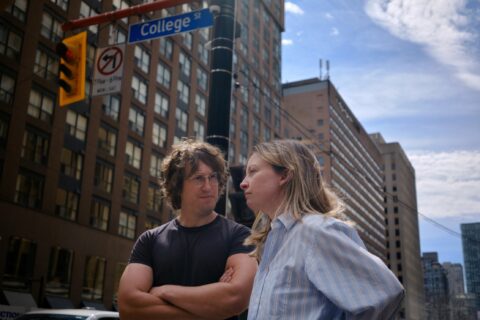“Prose is governed differently than poetry”
Pause
“By the rules of grammar”
After delivering this joke, creative writing lecturer Mara (Deragh Campbell) smiles, proud of finding a pedantic yet humorous way to continue her unit on Poetic Grammar.
“But I find, whether or not you intend to be a professional poet, the reading of poetry can sensitise you to the reading of prose.”
With this opening, Kazik Radwanski gives us a way to read Matt and Mara (2024), a film that scans prosaic — mumblecore dialogue, naturalistic performances — but with the inner shape of a poem; elusive, jagged, with a powerful propulsive force.
Despite whatever the simplistic “show, don’t tell” teachers in writing classes might tell you, some of the best films are neither poetry nor prose, but glide along the slippery surface of things, finding that sweet spot between talking about something and showing what is actually happening. That beautiful combination of talking and acting, the mouth making one bold claim while the body says the other. Some of my favourite filmmakers depict this contradiction wonderfully. Eric Rohmer. Hong Sangsoo. Kazik Radwanksi?
This is my first time watching one of his films, credited with kickstarting the New Canadian Cinema movement (i.e. good Canadian movies in English).
With Matt and Mara, he certainly makes a strong claim as one of the most interesting contemporary humanist directors, keenly attuned to the rhythms of everyday speech and finely-observed characters, and able to play with that form in a satisfying, fresh way. I’m certainly seeking out more of his work in the future.
It helps that he has his regular muse Deragh Campbell — last seen in Family Portrait (Lucy Kerr, 2023) — by his side, providing additional writing duties in the very specific conception of Mara, a woman settled into her creative writing career while putting her publishing work to one side.
She is a flinty, often quiet but also very self-conscious person, married to a musician. She boasts to his friends that she doesn’t listen to music. Then she gets annoyed when they find her strange. It speaks to her character that she thought they would respect her.
Her old, estranged friend Matt Johnson (BlackBerry [2023] director Matt Johnson playing a famous novelist variation on Matt Johnson) is everything she is not. He may not be traditionally handsome, but he’s confident, brash and able to strike up a conversation with absolutely anyone — even Mara’s head of department.
He’s in Toronto to look after his ailing father, and “maybe catch up with a few old girlfriends.” Campbell shows why she’s one of the best actresses in North American cinema in their scenes together, complementing Johnson’s easygoing personality with flashes of animation, as if seeing something vital in herself that only being with him can access.
She talks to her husband. She talks of an idea for a story. Two friends, who are known for being friends. Then one day they aren’t friends anymore. Defined by their friendship, they no longer know who they are. It’s a story she thinks she’s telling about herself and Matt. But she might just be talking about herself in relation to Matt.
It’s in this well-conceived distance between the imagined world and the very real, often cringy, extremely painful reality that Matt and Mara thrives.
Matt and Mara. Mara and Matt. It’s like Harry and Sally: when you put their names together, it feels like they are meant to be together. Feeling at first like a lazy title — just putting the protagonist’s names side by side — it slowly becomes something like a curse. Some may find it a love story. I think it’s closer to a horror. The very relatable horror of recognising your best self might be with the wrong person.
The film itself isn’t visually flashy, but it pays close attention to faces, often holding on them when the other person is talking. The real skill lies in the editing. It has a jagged way of cutting in and out of scenes, articulating through seemingly chaotic juxtaposition the very inarticulation and indecisiveness of its characters.
And when poetry does arrive, (and in a remarkable corny place for poetry to reside), it has a startling, mesmerising effect. It’s all very, very intentional. And it all works very well, in that magical way that only cinema — not poetry, nor prose — can.
Redmond is the editor-in-chief of Journey Into Cinema.
